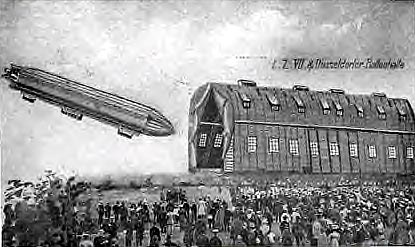

Hitler Watercolor: St. Peter's Church, Vienna
1909 Adolf Hitler—starving artist—now residing in Vienna, cancels his membership to the Museum Association in Linz. He probably takes this step, at least in part, because he can no longer afford to keep up his annual dues of 8.40 Kronen. [For further details, Click here.]

1913 Woodrow Wilson's First Inaugural Address: With trouble brewing between the great nations of Europe, Thomas Woodrow Wilson takes office as the 28th president of the United States
Wilson became president of Princeton University in 1902; he resigned the post in 1910 to run successfully for the governorship of New Jersey. Two years later, he won a tight race for the Democratic nomination for president, aided by a split in the Republican Party and the third-party candidacy of former president Theodore Roosevelt. After a vigorous campaign on a reformist platform dubbed New Freedom, Wilson outpolled both Roosevelt and the Republican incumbent, William Howard Taft, though he failed to capture a majority of the popular vote.
At his inauguration ceremony . . . Wilson made clear his vision of the United States and its people as an exemplary moral force: "Nowhere else in the world have noble men and women exhibited in more striking forms the beauty and the energy of sympathy and helpfulness and counsel in their efforts to rectify wrong, alleviate suffering, and set the weak in the way of strength and hope." Wilson's first term as president would be dedicated to pushing through ambitious domestic programs, including the Federal Reserve Act and the creation of the Federal Trade Commission; his second, which began in 1916, would be marked irrevocably by the First World War.
[For full article, Click here]
1916 World War I: Lord Northcliffe on the continuing Battle of Verdun:
What is the secret motive underlying the German attempt to break the French line at Verdun, in which the Crown Prince's Army is incurring such appalling losses? Is it financial, in view of the coming war loan? Is it dynastic? Or is it intended to influence doubting neutrals? From the evidence of German deserters it is known that the attack was originally intended to take place a month or two hence, when the ground was dry. Premature spring caused the Germans to accelerate their plans.
[For full article, Click here]
1917 World War I: Various:
When Adolf Meyer of the 16th RIR [List Regiment] is ordered to deliver a confidential dispatch between two regiments, the regimental sergeant major, Max Amman, teams him up with Gefreiter Adolf Hitler. Soon we [Meyer, with Hitler] had to leave this [cover] behind and make our way across open ground. The track led us past two [enemy] forward field guns. Scarcely had we entered the vicinity, when the enemy welcomed us with murderous fire. We realized immediately that we could be observed . . . . Had I been on my own, without thinking I would have made for deep cover . . . . My companion was of another mind. Without the slightest hesitation he sought, while taking every possible advantage of cover, to get out of that witches' kettle quickly. Naturally [I] had to follow. And it was just as well. Both of us came out unwounded from the danger zone. Two hours passed while we visited the two battalions. We set out on our return journey.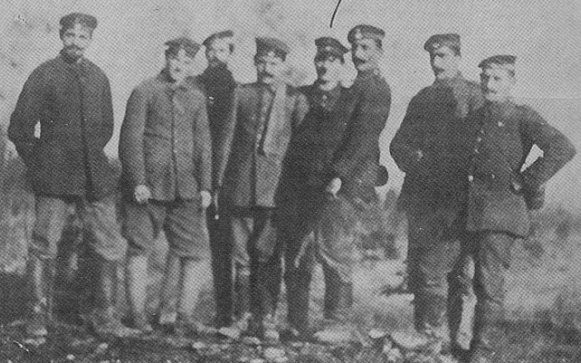
Hitler and his fellow dispatch runners
Scarcely had we arrived in the vicinity of the two guns when the enemy began employing his magic afresh. Understandably we did not stop this time and, unhurt but covered in sweat, we reached safety . . . . The dispatch runner Hitler was assigned to accompany me on several more occasions, and every time we came out unharmed. [For further details, Click here.]
Although we have centred counsel and action with such unusual concentration and success upon the great problems of domestic legislation to which we addressed ourselves four years ago, other matters have more and more forced themselves upon our attention - matters lying outside our own life as a nation and over which we had no control, but which, despite our wish to keep free of them, have drawn us more and more irresistibly into their own current and influence. It has been impossible to avoid them. They have affected the life of the whole world. They have shaken men everywhere with a passion and an apprehension they never knew before. It has been hard to preserve calm counsel while the thought of our own people swayed this way and that under their influence. We are a composite and cosmopolitan people. We are of the blood of all the nations that are at war.
[For full article, Click here]
1921 Inaugural Address of President Warren G Harding:

When one surveys the world about him after the great storm, noting the marks of destruction and yet rejoicing in the ruggedness of the things which withstood it, if he is an American he breathes the clarified atmosphere with a strange mingling of regret and new hope. We have seen a world passion spend its fury.
[For full article, Click here]
1933 Various: FDR inaugurated:
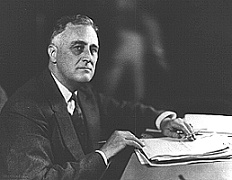
At the height of the Great Depression, Franklin Delano Roosevelt is inaugurated as the 32nd president of the United States. In his famous inaugural address, delivered outside the east wing of the U.S. Capitol, Roosevelt outlined his "New Deal"‑-an expansion of the federal government as an instrument of employment opportunity and welfare‑-and told Americans that "the only thing we have to fear is fear itself." Although it was a rainy day in Washington, and gusts of rain blew over Roosevelt as he spoke, he delivered a speech that radiated optimism and competence, and a broad majority of Americans united behind their new president and his radical economic proposals to lead the nation out of the Great Depression.
Born into an upper-class family in Hyde Park, New York, in 1882, Roosevelt was the fifth cousin of Theodore Roosevelt, who served as the 26th U.S. president from 1901 to 1909. In 1905, Franklin Roosevelt, who was at the time a student at Columbia University Law School, married Anna Eleanor Roosevelt, the niece of Theodore Roosevelt. After three years as a lawyer, he decided to follow his cousin Theodore's lead and sought public office, winning election to the New York State Senate in 1910 as a Democrat. He soon won a reputation as a charismatic politician dedicated to social and economic reform.
Roosevelt supported the progressive New Jersey governor Woodrow Wilson in his bid for the Democratic presidential nomination, and after Wilson's election in 1912 Roosevelt was appointed assistant secretary of the U.S. Navy, a post that Theodore Roosevelt once held. In 1920, Roosevelt, who had proved himself a gifted administrator, won the Democratic nomination for vice president on a ticket with James Cox. The Democrats lost in a landslide to Republicans Warren Harding and Calvin Coolidge, and Roosevelt returned to his law practice and undertook several business ventures.
In 1921, he was stricken with poliomyelitis, the virus that causes the crippling disease of polio. He spent several years recovering from what was at first nearly total paralysis, and his wife, Eleanor, kept his name alive in Democratic circles. He never fully covered and was forced to use braces or a wheelchair to move around for the rest of his life.
In 1924, Roosevelt returned to politics when he nominated New York Governor Alfred E. Smith for the presidency with a rousing speech at the Democratic National Convention. In 1928, he again nominated Smith, and the outgoing New York governor urged Roosevelt to run for his gubernatorial seat. Roosevelt campaigned across the state by automobile and was elected even as the state voted for Republican Herbert Hoover in the presidential election.
As governor, Roosevelt worked for tax relief for farmers and in 1930 won a resounding electoral victory just as the economic recession brought on by the October 1929 stock market crash was turning into a major depression. During his second term, Governor Roosevelt mobilized the state government to play an active role in providing relief and spurring economic recovery. His aggressive approach to the economic crisis, coupled with his obvious political abilities, gave him the Democratic presidential nomination in 1932.
Roosevelt had no trouble defeating President Herbert Hoover, who many blamed for the Depression, and the governor carried all but six states. During the next four months, the economy continued to decline, and when Roosevelt took office on March 4, 1933, most banks were closed, farms were suffering, 13 million workers were unemployed, and industrial production stood at just over half its 1929 level.
Aided by a Democratic Congress, Roosevelt took prompt, decisive action, and most of his New Deal proposals, such as the Agricultural Adjustment Act, National Industrial Recovery Act, and creation of the Public Works Administration and Tennessee Valley Authority, were approved within his first 100 days in office. Although criticized by many in the business community, Roosevelt's progressive legislation improved America's economic climate(History.com)
[See: Why Did the US Join the Fight Against Hitler?] Cordell Hull becomes America's 47th Secretary of State. Serving under President Franklin Roosevelt, he will be the longest-serving Secretary of State in US history.Esterwegen: a concentration camp (actually, a 'Strafgefangenenlager'‑-punishment camp for prisoners), opens near Hannover.
1934 Holocaust: Austria's leading newspaper, the Oesterreichischer Beobachter, states that Jews should be removed from all leading positions in Austria. (THP)
1936 First flight of airship Hindenburg.
1938 Hitler rejects British concessions in Africa. [See: Was Adolf Hitler an Insecure Dictator?]
1938 Austria: Chancellor Schuschnigg receives a report from the Austrian military attache in Italy concerning an interview with Mussolini. After assuring him that the situation is bound to improve, Mussolini warns against the idea of a plebiscite:
Mussolini: E un errore [it's a mistake]. If the result is satisfactory, people will say that it is not genuine. If it is bad, the situation of the government will be unbearable; and if it is indecisive, then it is worthless.
1939 Holocaust: Germany introduces a compulsory labor law for Jews, but does not allow them to become part of the German Labor Service (Arbeitdienst). (THP) 1941 World War II: Britain launches Operation Claymore:
The British navy raids a German position off the coast of Norway and inside the Arctic Circle (the Lofoten Islands). The raid, code name Operation Claymore, proved highly destructive of its target‑-an armed German trawler‑-but ultimately a failure in achieving its objective, the capture of an Enigma decoding machine.
The [British] severely damaged the trawler, called the Krebs, and killed 14 German sailors, took another 25 prisoner, and destroyed the Germans' local stockpile of oil. While the attack boosted British public morale temporarily, the Enigma machine still eluded the British military. The commander of the Krebs, Lieutenant Hans Kupfinger, threw it overboard before he was killed in the raid, but the Brits were able to recover documents that gave clues to the Enigma's workings. British intelligence was able to piece together enough of the German coding system to track German naval activity for about five weeks. (History.com)
1942 World War II: The Stage Door Canteen opens on West 44th Street in New York City. The canteen became widely known as a service club for men in the armed forces and a much welcomed place to spend what would otherwise have been lonely hours. The USO, the United Service Organization, grew out of the 'canteen' operation, to provide entertainment for American troops around the world. 1944 World War II: Eighth Air Force bombs Berlin for the first time:
Having already suffered heavy losses during day raids of various German industrial centers, the Americans had been cautious in pursuing night raids. But in March, with the RAF exhausted, the U.S. Eighth Air Force finally pursued night bombing and made Berlin its primary target. Fourteen U.S. bomber wings took off for Germany from England on the evening of March 4; only one plane reached Berlin (the rest dropped their loads elsewhere; few planes were lost to German defenses). In retrospect, the initial American attack was considered "none too successful" (as recorded in the official history of U.S. Army Air Force). Subsequent attacks in March were more effective. (History.com)
1946 Nuremberg Tribunal: Defense Application for Witnesses for Ernst Kaltenbrunner, Alfred Rosenberg, and Wilhelm Frick:
Sir David Maxwell-Fyfe: On the first six documents, which are quotations from various books on philosophy, the Prosecution submit that they are irrelevant to the question of the ideology propounded by the Defendant Rosenberg, which the Prosecution make part of the case against him. Of course, if the purpose is merely that Dr. Thoma would quote from such books in making his speech, and if he would let us know the passages he wants to quote so they can be dealt with mechanically, we do not make any anticipatory objection. I think that takes us up to Number 6, which are purely general books on philosophy. The Prosecution view with some dismay all these books being put in evidence and the Prosecutors' having to read them. I think I have made the position quite clear that if Dr. Thoma wishes to use them to illustrate the argument, and if he lets us know the passage, we make no general objection, but we object to their being put in as evidence, as not being relevant to the matters before the Court. "He [Rosenberg] ought to be glad I have NOT presented so many documents to show what a vicious anti-Semite he is," Thoma confided to Gilbert. "I have found the most damaging documents against him myself, and he ought to be glad I have NOT presented them! I told him, 'For gods sake, Rosenberg, you want me to make them think that you disapprove of the extermination, and didn't know anything about it, and yet you want me to present the documents to show that the extermination was justified!' He makes me sick." 1952 Wunderwaffen: Werner von Braun, Hitler's former chief rocket scientist now working for the US, publishes the English version of his 1948 book Das Marsprojekt, The Mars Project, his plan for a manned Mars mission which will use his proposed space station as a staging point. This ambitious plan calls for a fleet of ten spacecraft each carrying in addition to cargo one 200-ton winged lander, with nine crew vehicles transporting a total of 70 astronauts. [See: Wunderwaffen: Hitler's Deception and the History of Rocketry.] 1954 Cold War: Dulles asks for action against Communism: Speaking before the 10th Inter-American Conference, Secretary of State John Foster Dulles warns that "international communism" is making inroads in the Western Hemisphere and asks the nations of Latin America to condemn this danger. Dulles's speech was part of a series of actions designed to put pressure on the leftist government of Guatemala, a nation in which U.S. policymakers feared communism had established a beachhead.[For further details, Click here.]
1991 Germany: The Soviet parliament ratifies a six-nation treaty, setting the legal seal on German unification after two years of revolutionary change in central Europe. Edited by Levi Bookin (Copy editor) Click to join 3rdReichStudies FAIR USE NOTICE: This site may contain copyrighted material the use of which has not always been specifically authorized by the copyright owner. We are making such material available in our efforts to advance understanding of historical, political, human rights, economic, democracy, scientific, environmental, and social justice issues, etc. We believe this constitutes a 'fair use' of any such copyrighted material as provided for in section 107 of the US Copyright Law. In accordance with Title 17 U.S.C. Section 107, the material on this site is distributed without profit to those who have expressed a prior interest in receiving the included information for research and educational purposes. If you wish to use copyrighted material from this site for purposes of your own that go beyond 'fair use', you must obtain permission from the copyright owner. Please note that the list-owner and the moderators are not responsible for, and do not necessarily approve of, the random ads placed on our pages by our web server. They are, unfortunately, the price one pays for a 'free' website.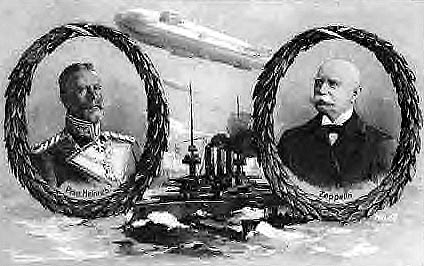
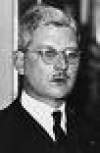
Dr Thoma (Counsel for Alfred Rosenberg): I do not think that it is possible without a consideration of world philosophy before Rosenberg's time to understand the morbid psychological state of the German people after their defeat in the First World War. Unless this psychological condition is appreciated, it is impossible to understand why Rosenberg believed that his ideas could help them. I am extremely anxious to show that Rosenberg's theories were representative of a phase of contemporary philosophy taught in similar form by many other philosophers both at home and abroad. I am extremely anxious to refute the charges made against Rosenberg's ideology as degenerate and‑-I must quote the expression‑-" a smutty ideology." [For the full text of today's proceedings, Click here.]
"The old boy wants to talk about the philosophy of the French Revolution," Biddle commented wryly, after the Tribunal rejected Rosenberg's request to trace the history of anti-Semitism. Fyfe, objecting to a number of witnesses Rosenberg wanted to call, remarked: "The only evidence is that Rosenberg wouldn't hurt a fly, and that the witnesses have seen him not hurting flies." 
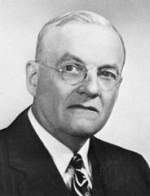
levi.bookin@gmail.com






